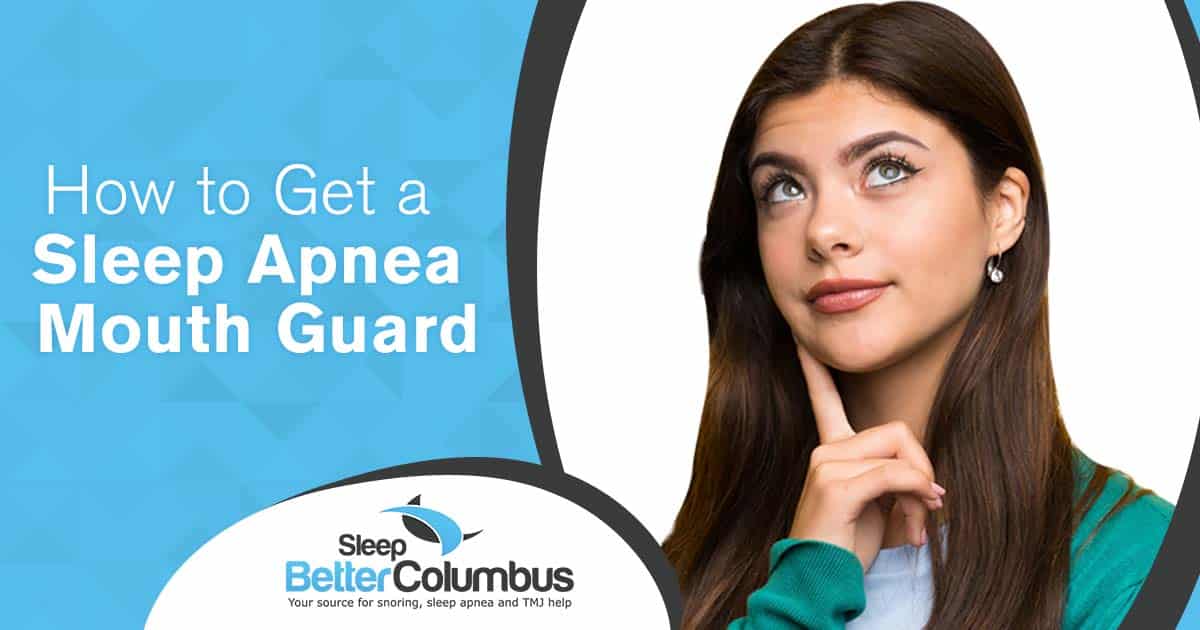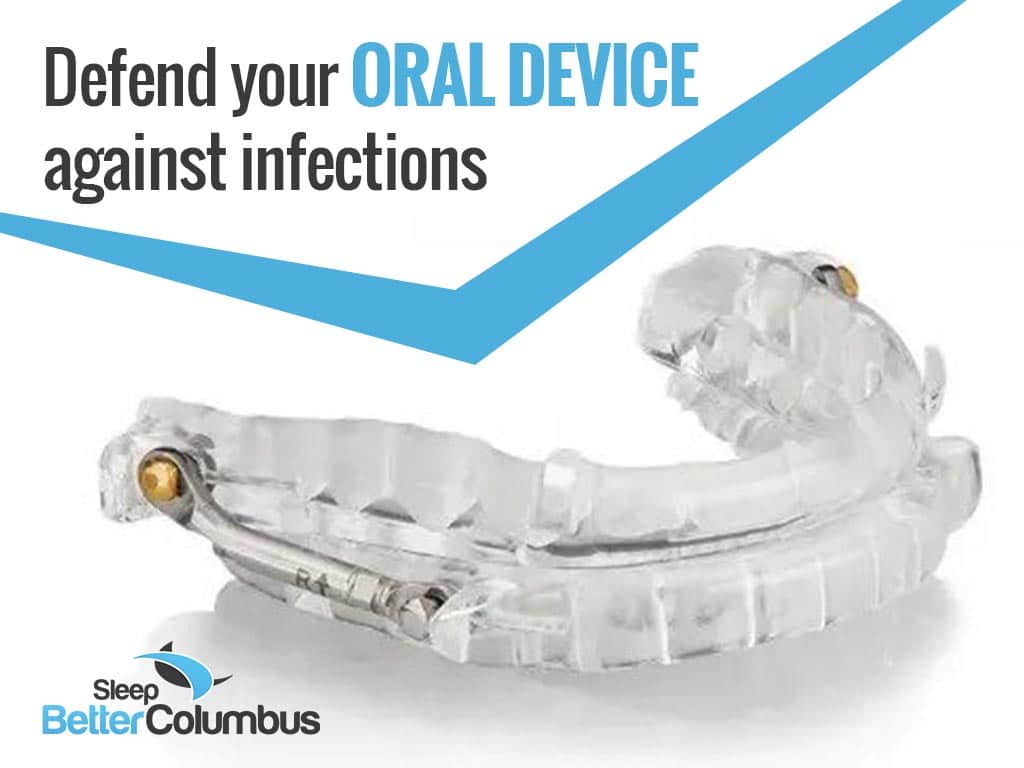When you’re wrestling with night time interruptions from sleep apnea, finding the proper treatment can be life-changing.
The thought of using a cumbersome CPAP machine can be daunting, and that’s where exploring the use of a sleep apnea mouth guard comes into play.
These ingenious devices, tailored to alleviate the symptoms of obstructive sleep apnea, provide a more comfortable and less invasive option, ensuring a peaceful slumber without bulkiness.
We’ll explore the options available and guide you through choosing one that fits your needs seamlessly.
Keep reading to learn how a simple mouth guard from Sleep Better Columbus could be the key to treating sleep apnea and reclaiming your nights.
Understanding the Need for Sleep Apnea Mouth Guards
Addressing and treating your sleep apnea is essential for ensuring a healthy, restful sleep.
Symptoms of obstructive sleep apnea (OSA) can range from minor symptoms like daytime fatigue to more serious health complications such as hypertension and cardiovascular disease.
When sleep apnea is left untreated, you will begin experiencing more severe health complications. If you struggle to use a CPAP or believe it’s not the right treatment option, a sleep apnea mouth guard might be your solution for Effective Sleep Apnea Therapy.
Exploring the Basics of Sleep Apnea and Its Dangers
Sleep apnea lurks unnoticed in many lives, a silent disruptor of restorative sleep. This sleep disorder forces your body to endure repetitive pauses in breathing, a condition that will lead to severe health issues if left untreated.
Awareness is the first defense against the creeping dangers of sleep apnea. The risk of heart complications, stroke, and even day-to-day challenges like excessive daytime sleepiness and concentration difficulties are real concerns that necessitate prompt attention:
| Health Complication | Potential Consequence of Untreated Sleep Apnea |
| Cardiovascular Issues | Increased Risk of High Blood Pressure, Heart Attack |
| Stroke | Possible Due to Oxygen Deprivation |
| Day-to-Day Challenges | Impaired Cognitive Function, Drowsiness |
Signs That You Might Need a Sleep Apnea Mouth Guard
Recognizing that you might benefit from a sleep apnea mouth guard begins with listening to your body and observing changes in your typical rest patterns. Loud, chronic snoring paired with episodes where your breathing seems to stop or gasping for air during the night are clear signals that point toward obstructive sleep apnea (OSA), where a mouth guard can come into play, offering a solution tailored to enhance airway stability.
Daytime signs of sleep apnea include constant morning headaches, sore throat or dry mouth upon waking, irritability, and exhaustion even after a whole night of sleep.
Types of Mouth Guards for Sleep Apnea Sufferers
All sleep apnea mouth guards are not created equal, and understanding the differences between over-the-counter (OTC) options and custom-fitted solutions provided by specialists like Sleep Better Columbus can help you decide which mouth guard would be the best choice for you.
Mandibular Advancement Splints (MADs) and Tongue Stabilizing Devices (TSDs) are effective treatment options for sleep apnea, but each works differently.
Examining the Difference Between OTC and Custom-Fit Options
Over-the-counter (OTC) mouth guards are readily available and often less expensive than custom-fitted solutions. Still, OTC models need a more precise fit, a custom-fitted option from a provider like Sleep Better Columbus can offer.
Custom-fitted mouth guards are more comfortable and effective in managing sleep apnea symptoms. Unlike generic OTC mouth guards, custom-fitted mouth guards are designed to conform perfectly to your dental structure after a careful assessment.
Reviewing Mandibular Advancement Devices and Tongue Stabilizing Devices
Mandibular Advancement Devices (MADs) are sophistically designed to combat obstructive sleep apnea effectively and also referred to as a mandibular advancement splint, MADs operate by gently shifting the lower jaw forward, a subtle motion that maintains an open airway, thus curtailing the obstructive episodes that are symptomatic of the sleep apnea sleep disorder.
Tongue Stabilizing Devices (TSDs) are oral appliances that treat sleep apnea by holding the tongue in place, thereby mitigating the risk of airway blockage that can contribute to sleep interruptions.
How to Choose the Right Sleep Apnea Mouth Guard for You
Choosing the appropriate sleep apnea mouth guard is paramount to ensuring effective treatment and a comfortable night’s sleep that contributes to a better quality of life.
Evaluate factors like fit, comfort, and adjustability, and keep your specific diagnosis and unique breathing patterns in mind when selecting an oral appliance that will best fit your needs.
Evaluating Fit, Comfort, and Adjustability Features
A mouth guard’s effectiveness in treating sleep apnea is linked with its fit, which should be snug but not constrictive, ensuring it stays in place to perform its job without causing any discomfort.
Your mouth guard should feel comfortable enough to wear quickly for your sleep. Adjustable mouth guards will allow you to fine-tune the oral appliance to ensure ongoing comfort and efficacy and account for any subtle changes in your dental structure.
Considering Your Specific Diagnosis and Breathing Patterns
Diagnosing sleep apnea is a personal journey, and an intensive evaluation of your breathing patterns during sleep is vital. Not everyone will exhibit the same breathing patterns or severity. It’s critical to consider whether you’re contending with obstructive sleep apnea, central sleep apnea, or complex sleep apnea syndrome, as each type dictates a specialized approach to manage breathing disruptions effectively with an oral appliance.
The Proper Way to Use a Sleep Apnea Mouth Guard
Understanding how to use the mouth guard correctly is as critical as the initial decision to adopt this therapy. Knowing how to use and care for your sleep apnea mouth guard properly will help you easily add your mouth guard to your nightly routine and maintain the longevity of your oral appliance.
Step-by-Step Instructions on Wearing Your Device Correctly
After you’ve decided to use a mouth guard to treat your sleep apnea, you’ll go through a fitting process with a sleep medicine healthcare provider who will then design your custom device. When you are ready for bed, you’ll insert your mouth guard in your mouth and press it against your upper and lower dental arches to ensure it fits snugly so it will work effectively.
Tips for Maintaining Hygiene and Longevity of Your Mouth Guard
Maintaining the hygiene of your sleep apnea mouth guard is an aspect of treatment that should always be considered. It ensures not only the effectiveness of the device but also secures your oral health. A good routine is to clean your mouth guard with cool water and a soft-bristle toothbrush every morning before placing it in its unique container; avoid any harsh chemicals or boiling water that could deform your oral appliance.
| Maintenance Step | Reason | Frequency |
| Cleaning with cool water and a soft-bristle toothbrush | To remove bacteria and prevent oral health issues | Daily |
| Inspection for wear and tear | To ensure the device’s integrity and proper function | Weekly |
| Avoiding harsh chemicals and boiling water | To prevent material deformation | Each cleaning |
Sleep Better Columbus – Custom Sleep Apnea Mouth Guards
Understanding and treating sleep apnea with the appropriate mouth guard is essential for achieving restful sleep and maintaining overall health.
Paying attention to sleep apnea symptoms, such as chronic snoring and gasping for breath, is critical for prompt, timely intervention with devices like Mandibular Advancement Devices (MADs) or Tongue Stabilizing Devices (TSDs).
Proper use and maintenance of your sleep apnea mouth guard are critical for its effectiveness and oral health.
Mouth guards are an effective treatment option that can alleviate the impact of sleep apnea and allow you to enjoy the benefits of a peaceful night’s sleep.
To learn more about how you can get a custom sleep apnea mouthguard or to schedule your appointment, call Sleep Better Columbus at (614) 777-7350 or contact our sleep apnea experts online.




